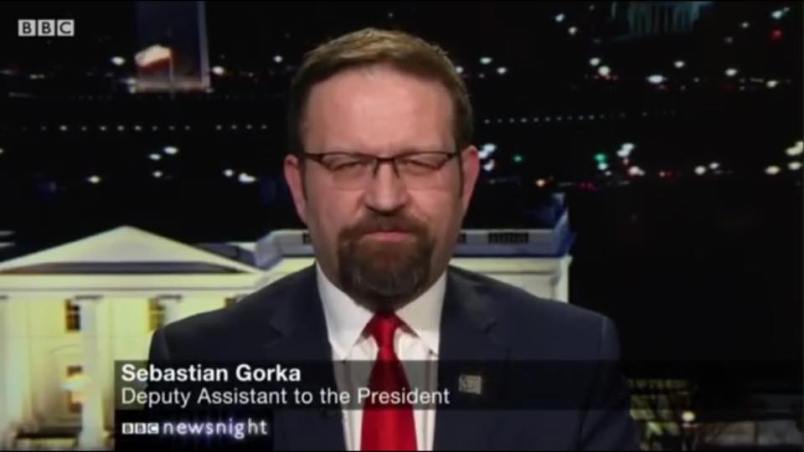According to White House aide Sebastian Gorka, persistent racial disparities in the U.S. can be attributed to a “dependency culture” created by the Democratic Party.
“Today I do not see, as a nation, systemic persecution based on skin color,” he said in an interview with the Center for Investigative Reporting’s “Reveal” podcast that aired Thursday.
Gorka, a London-born Hungarian who moved to the U.S. in 2008, argued that Democrats devote too much attention to identity politics and the historical roots of inequality.
He is a former Breitbart News editor whose work as self-styled counterterrorism expert has come under scathing criticism from others in the field, and now serves as President Donald Trump’s deputy assistant.
“Reveal” host Al Letson, who is black, pushed back on Gorka’s perspective, pointing out that people of color, transpeople and other minority groups across the country “are affected by laws or by the way other Americans treat them.”
“So by saying ‘I’m not seeing race, I’m not seeing sexuality, I’m not seeing religion,’ you’re saying ‘I’m not seeing all the things that are like keeping society inequitable,’” Letson said, noting that black Americans still lag far behind their white counterparts in income and wealth.
“But what’s the cause for that?” Gorka asked. “As far as I’m concerned, it’s not because of systematic oppression by the state; it’s not because of the laws we had in the 1950s; it’s not because of Jim Crow. The reality is it is the other side, the side that lost, that has for 30 years kept black Americans down.”
Letson argued that the “inequities that have been built into American culture are still there” and that the U.S. economy was built on the genocide of Native Americans and centuries of chattel slavery.
“What I’m saying is in the structure of America, white supremacy is built in,” Letson said.
Gorka disagreed, saying he had a different perspective as an immigrant.
“As someone who consciously chose to be a citizen of this great nation I wholeheartedly reject your assertion that white supremacism is some foundational element of our society,” he said. “Historically it existed but my issue is this: how are you helping bridge divisions by using phrases like white supremacism? Because white supremacism is a conscious decision. It’s the individual who is denying the other their civil rights. Today I do not see, as a nation, systemic persecution based on skin color.”
Letson told Gorka that his own ancestors weren’t allowed to choose their country, and said that a lot of racism was actually unconscious.
White nationalism is alive and well—and reports of racist incidents are spiking—in the United States today, according to the Southern Poverty Law Center and other organizations that track hate crimes and groups.
Citing a spike in the number of white nationalist groups, SPLC senior fellow Mark Potok called 2016 a “banner year for hate” that saw a “resurgence of white nationalism” in the U.S. Hundreds of hate crimes against Muslims, LGBT people, immigrants, Jews and African Americans were reported last year.
Towards the end of the “Reveal” interview, Letson said diversity was a “beautiful thing” that would allow the U.S. to reach its full potential.
“Diversity is a wonderful and beautiful thing but only if you have shared values,” Gorka replied. “If you don’t, diversity for the sake of diversity is chaos.”







FFS. These people have to go.
All this time we thought Colbert was channelling O’Reilly. We didn’t even know this clown existed.
But Colbert did.
Eerie…
Gorka continued, “And I, for one, do not value diversity.”
Whitesplains the rich, privileged, insider enjoying all the benefits of a Constitution that enshrined slavery.
Why the eff is Gorka even speaking on this topic on a news channel? He’s not studied the topic, and he sure as hell hasn’t lived with the people who are affected by systemic bias.
Boot him off your guest lists, producers.